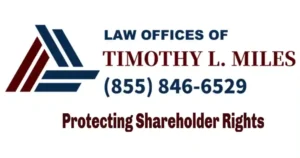Introduction to the Elevance Health Class Action Lawsuit
The Elevance Health class action lawsuit – captioned Miller v. Elevance Health, Inc., No. 25-cv-00923 (S.D. Ind.) – seeks to represent purchasers of Elevance Health, Inc. (NYSE: ELV) common stock and charges Elevance Health and certain of Elevance Health’s top executives with violations of the Securities Exchange Act of 1934.
If you suffered substantial losses and wish to serve as lead plaintiff of the Elevance Health Class Action Lawsuit, or just have general questions about you rights as a shareholder, please contact attorney Timothy L. Miles of the Law Offices of Timothy L. Miles, at no cost, by calling 855/846-6529 or via e-mail at [email protected]. Lead plaintiff motions for the Elevance Health Lawsuit must be filed with the court no later than July 11, 2025.
Read on for answers to eight of the most frequently asked questions by investors in the Elevance Health Class Action Lawsuit.
1. What is the Securities Exchange Act of 1934?
The Securities Exchange Act of 1934, commonly known as the Exchange Act, is a pivotal piece of federal legislation in the United States that governs the trading of securities such as stocks and bonds. This act was enacted by Congress in response to the stock market crash of 1929 and the subsequent Great Depression, with the primary aim of restoring investor confidence in the financial markets by ensuring greater transparency and reducing fraudulent activities.
The Exchange Act established the Securities and Exchange Commission (SEC), which is responsible for enforcing federal securities laws and regulating the securities industry, including stock exchanges, brokerage firms, and other market participants.

One of the key provisions of the Securities Exchange Act of 1934 is the requirement for public companies to register their securities with the SEC and to file periodic financial reports, such as annual and quarterly reports.
These disclosures are intended to provide investors with significant information about a company’s financial health, operations, and management practices, thereby enabling them to make informed investment decisions.
The act also prohibits various types of fraudulent and manipulative practices in the securities markets, including insider trading, which involves trading based on non-public, material information.
In recent years, the Securities Exchange Act of 1934 has played a crucial role in addressing issues related to corporate misconduct and protecting investor interests. For example, in cases like the Elevance Health Class Action Lawsuit, investors have relied on the protections offered by the Exchange Act to seek redress for alleged violations.
The Elevance Health Class Action Lawsuit involves claims that the company misled investors about its financial prospects and operational integrity. Such lawsuits underscore the importance of the Exchange Act’s provisions in holding companies accountable and ensuring that they adhere to ethical standards in their dealings with shareholders.
Moreover, the act empowers the SEC to regulate securities trading practices, including margin requirements and short selling, to prevent excessive speculation and promote market stability. The SEC also oversees self-regulatory organizations (SROs) like the Financial Industry Regulatory Authority (FINRA), which play a vital role in maintaining fair and orderly markets. Through these regulatory mechanisms, the Exchange Act seeks to protect investors from market abuses and promote public confidence in the integrity of the financial markets.
Overall, the Securities Exchange Act of 1934 remains a cornerstone of U.S. financial regulation. By mandating transparency, deterring fraud, and fostering accountability among market participants, it helps maintain a fair and efficient marketplace. The act’s relevance continues to be evident in contemporary legal actions such as the Elevance Health Class Action Lawsuit, which highlight its critical role in safeguarding investor interests and upholding market integrity. As financial markets evolve, ongoing vigilance and enforcement of the Exchange Act’s provisions are essential to ensuring that they function effectively for all stakeholders.
2. What is the Securities Act of 1933?
The Securities Act of 1933, also known as the “Truth in Securities” law, was enacted by the United States Congress in the aftermath of the stock market crash of 1929 and the ensuing Great Depression. Its primary purpose is to ensure greater transparency in financial statements so investors can make informed decisions about investments.
The Act requires that any offer or sale of securities be registered with the SEC, providing essential information about the issuer and the security being offered. This registration process includes disclosing financial statements and other pertinent data to protect investors from fraud and misrepresentation.

One notable aspect of the Securities Act of 1933 is its emphasis on full and fair disclosure, which aims to prevent deceit, misrepresentations, and other forms of fraud in the securities market. By mandating detailed disclosures, the Act seeks to level the playing field for all investors, fostering a more stable and trustworthy market environment.
Over time, the Act has been instrumental in shaping the regulatory framework for securities in the U.S., setting a precedent for subsequent legislation aimed at enhancing investor protection and market integrity.
The Act’s impact can be seen in various financial regulations and lawsuits, including high-profile cases such as the Elevance Health Lawsuit. In such cases, compliance with the disclosure requirements of the Securities Act of 1933 is often scrutinized to determine whether investors were adequately informed about the risks associated with their investments.
The Elevance Health Lawsuit underscores the importance of adhering to these regulations to maintain market confidence and protect investor interests.
3. What is the Private Securities Litigation Reform Act of 1995?
The Private Securities Litigation Reform Act of 1995 (PSLRA) is a pivotal piece of legislation in the United States aimed at curbing frivolous securities lawsuits and ensuring the integrity of the securities market. Enacted by Congress and signed into law by President Bill Clinton, the PSLRA instituted several key reforms to improve the legal landscape for both plaintiffs and defendants involved in securities litigation.
One of the principal features of the PSLRA is the imposition of stringent pleading standards for plaintiffs, requiring them to specify each statement alleged to be misleading, and the reasons why the statement is misleading. This aspect significantly raises the bar for initiating a securities fraud lawsuit, thereby deterring baseless claims.
Another critical component of the PSLRA is the introduction of a “safe harbor” provision for forward-looking statements. This provision protects companies from liability for projections, forecasts, and other forward-looking statements that are made in good faith and accompanied by meaningful cautionary language.

The intent is to encourage corporate transparency and communication with investors without the constant fear of litigation over future-oriented disclosures. Moreover, the PSLRA mandates that courts appoint a lead plaintiff in class action lawsuits based on their financial interest in the case, which aims to ensure that those with substantial stakes are steering the litigation in the best interest of all shareholders.
The reforms set forth by the PSLRA have had a profound impact on securities litigation, including cases such as the Elevance Health Class Action Lawsuit. By raising pleading standards and providing protections for forward-looking statements, the PSLRA has helped reduce frivolous claims and fostered a more balanced environment for securities litigation.
As such, it continues to play a crucial role in maintaining investor confidence and promoting fair practices within the financial markets.
4. What Is the Sarbanes-Oxley Act of 2002?
The Sarbanes-Oxley Act of 2002, often abbreviated as SOX, is a pivotal piece of legislation enacted in response to a series of high-profile corporate scandals, including those involving Enron, Tyco International, and WorldCom. These scandals shook investors’ confidence in the integrity of financial markets, leading to the implementation of SOX with the aim of enhancing corporate accountability and protecting shareholders by improving the accuracy and reliability of corporate disclosures.
Key provisions of the Sarbanes-Oxley Act include stringent requirements for financial reporting, greater transparency, and stricter penalties for fraudulent financial activities. The Act mandates that senior executives take personal responsibility for the accuracy of financial statements, introduces mandatory internal controls and procedures for financial reporting, and establishes new standards for audit committees and external auditors.

One notable aspect of the Sarbanes-Oxley Act is its emphasis on the independence of auditors. By requiring that auditors are not influenced by conflicts of interest, SOX seeks to ensure that companies’ financial statements are audited objectively and accurately.
Additionally, the Act created the Public Company Accounting Oversight Board (PCAOB), which oversees the audits of public companies to further protect investors’ interests. This regulatory framework has significantly impacted how businesses operate, compelling them to adopt more rigorous internal controls and compliance measures.
In contemporary contexts such as the Elevance Health Lawsuit, the principles established by the Sarbanes-Oxley Act continue to be highly relevant. Cases involving allegations of financial improprieties or lack of transparency are often scrutinized under the provisions of SOX to determine whether there have been violations of its stringent requirements.
The ongoing influence of SOX highlights its role in fostering a culture of accountability and ethical behavior in corporate governance.
5. What Is Securities Fraud?
Securities fraud is a serious offense involving deceptive practices in the stock or commodities markets that can result in significant financial loss for investors. This type of fraud typically occurs when an individual or entity, such as a corporation, provides false information or omits critical details that mislead investors about the value of a particular security.
Such fraudulent activities can include insider trading, misrepresentation of financial statements, and market manipulation. The consequences of securities fraud can be severe, leading to legal action, financial penalties, and reputational damage for the parties involved.
A notable example of securities fraud is the Elevance Health Class Action Lawsuit. This lawsuit was filed against Elevance Health due to allegations that the company misled its investors by providing inaccurate information about its financial health and business operations. Investors claimed that they were misinformed about the company’s true financial status, which led to significant investment losses when the truth was revealed. Class action lawsuits like this one are crucial for holding corporations accountable and ensuring that they provide transparent and accurate information to their stakeholders.
The impact of securities fraud extends beyond individual investors, as it undermines public trust in the financial markets and can destabilize economies. Regulatory bodies such as the Securities and Exchange Commission (SEC) play a vital role in detecting and prosecuting securities fraud to maintain market integrity.
Investors are encouraged to perform due diligence and remain vigilant to protect themselves from potential fraudulent schemes. Understanding the intricacies of securities fraud and staying informed about ongoing cases, such as the Elevance Health Class Action Lawsuit, can help investors make more informed decisions and safeguard their investments.
6. What Is a Securities Class Action?
A securities class action is a type of lawsuit filed on behalf of a group of investors who have suffered financial losses due to fraudulent or misleading practices by a company in which they have invested. These lawsuits typically arise when a company violates federal or state securities laws, leading to a significant drop in the value of its stock, bonds, or other securities.
The purpose of a securities class action is to provide a mechanism for investors to collectively pursue their claims without the need for each individual investor to file a separate lawsuit. By consolidating their efforts, investors can more effectively hold companies accountable for their actions and potentially recover a portion of their losses.
One notable example of a securities class action is the Elevance Health Lawsuit, which involves allegations against Elevance Health for engaging in practices that misled investors about the company’s financial health and prospects. This type of litigation typically involves complex legal and financial issues, requiring the expertise of specialized attorneys who are experienced in securities law.
The outcome of such lawsuits can result in substantial settlements or judgments, which are distributed among the affected investors based on the extent of their losses. In addition to providing financial compensation, securities class actions play a crucial role in promoting transparency and integrity in the financial markets.
The process of initiating a securities class action begins with the identification of potential violations through investigations conducted by law firms, regulatory agencies, or whistleblowers. Once sufficient evidence is gathered, a lead plaintiff is chosen to represent the class of affected investors. The case then proceeds through various stages, including filing the complaint, discovery, and potentially going to trial or reaching a settlement.
Throughout this process, legal teams work diligently to prove that the company’s actions directly caused the investors’ losses. The Elevance Health Lawsuit serves as a reminder of the importance of vigilance and accountability in protecting investor interests and maintaining trust in the financial system.
7. What Are Reputational Damages Under the Securities Laws?
Reputational damages under securities laws refer to the harm inflicted on a company’s public image and investor confidence as a result of alleged or proven violations of securities regulations. These violations can include fraudulent activities, misrepresentation of financial statements, insider trading, or failure to disclose crucial information to investors.
When a company faces allegations or is found guilty of such misconduct, its reputation suffers significantly, leading to potential financial losses, decreased stock prices, and a loss of trust among stakeholders. The impact of reputational damage is often long-lasting and can be more detrimental than any immediate financial penalties imposed by regulatory bodies.

For instance, in cases like the Elevance Health Lawsuit, where allegations of securities law violations come to light, the affected company may experience substantial reputational damage. Elevance Health, amid such legal challenges, would likely encounter skepticism from investors and the public, triggering a decline in stock value and possibly deterring future investments.
Rebuilding trust after such damage requires stringent corrective measures, transparent communication with stakeholders, and often, a significant overhaul of corporate governance practices.
Moreover, the ripple effect of reputational damage extends beyond immediate financial loss. It can lead to increased scrutiny from regulators, higher costs of capital due to perceived risks, and difficulty in attracting and retaining top talent.
In essence, reputational damage under securities laws underscores the critical importance of maintaining ethical practices and robust compliance mechanisms within corporations to safeguard their long-term viability and market position. The case of the Elevance Health Lawsuit serves as a poignant reminder for companies to adhere strictly to securities regulations to protect their reputation and ensure sustained investor confidence.
8. What Is Section 10(B) of the Exchange Act and Rule 10b-5?
Section 10(b) of the Securities Exchange Act of 1934 and Rule 10b-5 are critical components of U.S. federal securities law, aimed at maintaining the integrity of financial markets by prohibiting fraudulent activities. Section 10(b) grants the Securities and Exchange Commission (SEC) the power to regulate and oversee deceptive practices in the securities market.
Specifically, it targets manipulative and deceptive devices in connection with the purchase or sale of any security. Rule 10b-5, promulgated under this section, further delineates unlawful conduct, making it illegal to employ any scheme to defraud, make untrue statements of material facts, or omit necessary information that would render statements misleading.
In the context of corporate misconduct, these regulations are often invoked in class action lawsuits by shareholders who believe they have been misled or harmed by fraudulent activities. For instance, the Elevance Health Class Action Lawsuit could potentially involve allegations that the company violated Section 10(b) and Rule 10b-5 by making false or misleading statements about its financial health or business operations. Shareholders affected by a decline in stock value due to such alleged misrepresentations may seek remedies under these provisions.
Understanding Section 10(b) and Rule 10b-5 is essential for both investors and corporate entities. Investors rely on these regulations to protect their interests and ensure transparency in the market, while corporations must adhere to these rules to avoid legal repercussions and maintain investor trust. The Elevance Health Class Action Lawsuit exemplifies how these legal frameworks operate in real-world scenarios, highlighting their role in fostering a fair and transparent investment environment.
Contact Timothy L. Miles Today About an Elevance Health Class Action Lawsuit
If you suffered losses in Elevance Health stock, call us today for a free case evaluation about an Elevance Health Class Action Lawsuit. 855-846-6529 or [email protected] (24/7/365).
Timothy L. Miles, Esq.
Law Offices of Timothy L. Miles
Tapestry at Brentwood Town Center
300 Centerview Dr. #247
Mailbox #1091
Brentwood,TN 37027
Phone: (855) Tim-MLaw (855-846-6529)
Email: [email protected]
Website: www.classactionlawyertn.com
Facebook Linkedin Pinterest youtube



